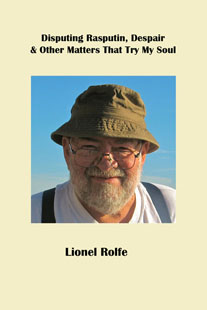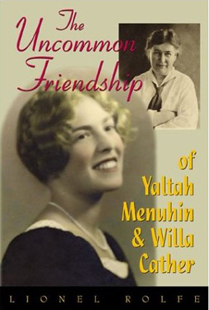Disputing Rasputin, Despair & Other Maters That Try My Soul
Lionel Rolfe
Author and journalist Lionel Rolfe says these essays may be his final summing up. At the moment he feels they are. But Rolfe has published eight books, and he similarly felt this way after each one of them was published, he admits.
Many of his books are focused on California, which he sees as a state of mind as much as the most significant state in the American union. He has worked as a staffer and a prolific freelancers for for some of the most prestigious newspapers in California–the Los Angeles Free Press, the Los Angeles Times, and the San Francisco Chronicle. He was for a decade the last editor of the B’nai Brith Messenger, the second oldest newspaper in Los Angeles until its death in the late ‘90s. Read more
The Uncommon Friendship between Willa Cather and Yalta Menuhin
This is an extraordinary story of the friendship between Willa Cather and the author’s mother, piano prodigy Yaltah Menuhin (1920-2001), sister of violinist Yehudi Menuhin. There is currently a resurgence of interest in the remarkable American author Willa Cather (1873-1947), many of whose novels explored women and creativity. This is a personal, yet universal, book which explores Cather’s mentoring of the young pianist. It illuminates the lives and works of two important women artists and raises provocative questions about the effects of social and family constraints on the lives of brilliant women. Against the tumultuous backdrop of America and Europe in the early and mid-20th century, Rolfe presents an engrossing chronicle of his mother’s struggle as a budding musician, her tragic relationship with her parents, and the solace she found when Cather became her mentor. The mutually inspiring friendship, which endured for decades, inspired some the most memorable heroines in Cather’s novels, notably Lucy Gayheart. Read more
Tom Paine, A Professional Revolutionary
By LIONEL ROLFE
Alaine Lowell lived through the revolutionary ’60s — a young woman born of the counterculture and intent on experiencing the time-honored odyssey of finding one’s self.
Lowell was a product of those more free-thinking and open-minded times and still firmly held onto those values by the late 1970s, which made her budding friendship at that time with George Holtz, a Republican real estate entrepreneur more than 35 years her senior, somewhat uncommon.
The two met while Lowell was living in Castle Green and Holtz was a member of the historic structure’s board of directors. Their relationship was “never romantic,” Lowell explains. They were friends and business associates through the Old Pasadena landmark she lived in and he helped oversee. Read more
BRIAN BANKS: THE SUCCESSFUL RECLAMATION OF A LIFE
By Bob Vickrey
The Atlanta Falcons’ recent signing of an unproven linebacker would normally not command much media attention, but the circuitous route Brian Banks has been forced to travel in order to have the opportunity to play professional football is truly a remarkable one.
The well-documented story of the talented Southern California high school football player who was on the verge of college stardom, but wrongly convicted of rape, is one that has riveted the nation—not just the sports world. Perhaps it offers us a cautionary tale about the inherent biases of our legal system against defendants who are unable to provide witnesses in their own defense and the ensuing imminent rush to judgment that often prevails. Read more
Thinking about Oz
Leslie Evans
Oz Reimagined: New Tales from the Emerald City and Beyond. Edited by John Joseph Adams & Douglas Cohen. Las Vegas, NV: 47North, 2013. 365 pp.
The Living House of Oz. Edward Einhorn. Illustrated by Eric Shanower. San Diego: Hungry Tiger Press, 2005. 238 pp.
The land of Oz is a beloved American legend. It is known to most people from the 1939 musical film starring Judy Garland, Ray Bolger, Bert Lahr, and Jack Haley, still revived regularly on television and available on DVD. The film captured the look of the place much as it had been envisaged by its creator, L. Frank Baum, back in 1899: a vividly colored fairyland filled with odd but simple people and many magical creatures, from witches to live trees, winged monkeys, and Oz’s famous automatons, the Scarecrow and the Tin Woodman. These images are engrained on the American psyche. Read more
Bukowski Found On Sunset Boulevard

Our loyal reader, Ronald Van Ammers, spotted this pickup truck on Sunset Boulevard. It wasn't clear if the owner like Bukowski, or was related to him.
Fallout From The Egyptian Crisis Affecting The People of Gaza
By Mohammad S. Arafat
The Gaza strip, a besieged part of Palestine, is the most populous place in the world–it has some 1.79 million people, or about 2,600 people per kilometer.
There’s always something going wrong here. There’s constant crisis, and it’s probably more affected by its neighbors than most lands. Once this wasn’t true. Before the occupation in 2006, after the election which closed both the Israeli and Egyptian ports we had access to, the quality of our life plummeted.
There are more sick people, more poor people, and more suffering–with our neighbors hardly helping us. And we have Israel, which assaults us. Still, most Gazans remain religious, praying daily and nightly to Allah and being patient in our belief we have not lost Allah’s mercy. We say that Allah is with us and will not forget us. Read more
Honey explains why we have the Silver Lake neighborhood in Los Angeles
By Honey van Blossom
(Honey is a Belgian Marxist former strip-tease artiste.)
Today’s Libertarians would have found utopia in early American-occupied Los Angeles. Americans – including among them new American citizens from Europe — stepped into the Mexican system of public and common lands and transformed the land through private entrepreneurship. Speculators created “Ivanhoe Town,” the boundaries of which roughly correspond to the Silver Lake district, towards the end of that free market idyll. The Kenilworth tract adjoined, and that is now partly Los Feliz and partly Griffith Park. Also, there were other tracts that adjoined the Ivanhoe area: Golden Gates, Childs, Edendale. Today’s Silver Lake neighborhood was to remain, however, mostly grazing land until the 1920s.
The early speculators acquired the former rancho land that comprised much of “Ivanhoe Town” because of the 1851 California Land Claims Act, which led to the former Mexican citizens’ loss of the ranchos that had thrived through peonage labor; that is, Indian labor that was close to slavery. The Americans also used “free” Indian labor to build their capitalist city.
Rancho property often became the property of the rancheros’ lawyers, who sold the land to real estate speculators. American property owners voluntarily taxed themselves to build roads, and speculators financed a complex system of privately owned interurban railways so that prospective buyers could reach home sites. The Feliz family daughters sold off some of the land on the Feliz Rancho for $1 an acre to the family attorney and the son transferred most of the rest to him when he died, perhaps for legal fees incurred in claiming the rancho in American courts. Read more









